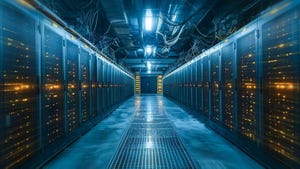
Insight and analysis on the data center space from industry thought leaders.
What's the Storage Engineer's Future Role in IT?
As an IT professional, it is critical that you see yourself as a business professional and not simply a technology specialist.
April 18, 2016

Matt Watts is Director of Technology and Strategy for NetApp EMEA.
Over the next four years, 35 percent of the core skills you have today will change. As a storage engineer, what do you think these changes might be?
I recently had an interesting meeting with storage engineers who were considering a move to a commodity type storage infrastructure with little or no data management capabilities.
They were so enamored by the technical specifications of the new equipment that they said they were quite comfortable giving all of the data management capabilities that were inherent in their existing storage array up to the virtualization layer or to the applications themselves. Basically all of the value that used to be offered like data management, data protection, and replication capabilities were going to be given to other teams in the organization.
If you take all the value you used to deliver and give it to someone else to do, what exactly will you do in the future and why would your company need so many of you?
As hypervisor and application levels of protection become more robust you effectively give up a significant part of the value you used to offer. You need a clear view on what you believe your role is going to be in the future, because it clearly will be quite different than the role you currently have today.
I’ve been in the storage business 20 years. Back then, our focus was really granular. We had to focus on which area of the physical disk where we stored the data; outer-edge, outer-middle, center, inner-middle, or inner-edge. Each location provided different performance.
We then evolved to choosing different RAID levels. Each type of RAID offered benefits but also drawbacks. Raid 0 was fast but with limited protection. RAID 10 was fast as well, but it had a significant capacity overhead. RAID 4 and 5 were efficient, but they had parity overheads which could limit performance.
Today, RAID has evolved so far that whilst it’s still a consideration, it’s just a tiny part of what we concern ourselves with. Now we worry about the volumes and policy. We think about what volumes are going to be created, what level of protection they require, as well as replication and application integration. This policy type management is where we are now.
Going back to my meeting with storage engineers, what was really interesting was that even this seemed to be no longer their concern. They are now giving the data management capabilities back to the teams that manage the application or virtualization layer.
So what’s left? The logical conclusion in this case is that managing storage is becoming less complex and therefore requires fewer people.
The Business of the Business
Within IT, the focus has to move more to understanding what the business wants to do with the applications and the data they create. Storage engineers need to be closer to these teams. The connection between those using the service and those delivering it has to be much stronger. You used to look at the physical, but now the question is much more about the reasons behind the data being created: how to make it simple, keep it fluid and agile, and with accelerated cycles. It’s a much more service oriented approach, tying into best practices.
With more companies moving to a hybrid cloud approach, some of the storage you are going to be deploy may not be your own. If a service is required for test or development and you need to deploy quickly, then maybe AWS is an option.
You need to help create the policy framework for keeping data on premise or deployed to a hybrid cloud. And if you choose a hyperscale provider such as AWS, then you’d better be sure you can easily bring data back.
Technology moves at an incredibly fast pace. It’s incumbent on all of us to consider what technologies may be appropriate for the future. But equally important is for us to consider what our role will become as these changes occur.
The changes in technology are both exciting and intimidating. As an IT professional, it is critical that you see yourself as a business professional and not simply a technology specialist. Finding ways to contribute to the success of the business will be a key skill in the future.
Industry Perspectives is a content channel at Data Center Knowledge highlighting thought leadership in the data center arena. See our guidelines and submission process for information on participating. View previously published Industry Perspectives in our Knowledge Library.
About the Author
You May Also Like









